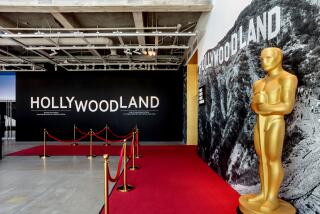Festival Explores Jewish Films : Cinema: The continuity of generations permeates Sherwood Auditorium series in La Jolla.
SAN DIEGO — Early in “Half the Kingdom,” Francine Zuckerman’s documentary about the role of women in Judaism, a woman expresses her horror at discovering a line in a traditional prayer recited by men that roughly translates as “Thank God for not making me a woman.”
She relates how she failed to get her husband to stop saying the prayer. He explained that he didn’t mean it to be sexist, and she acquiesced. But their young daughter went to her father with the same revulsion, and persuaded him to stop saying the prayer.
“I learned from that one incident that if there are things I couldn’t accomplish, the next generation might,” she says.
That sense of generations, a universal theme of continuity, permeates the selections for the First Annual San Diego Jewish Film Festival, organized by the M. Larry Lawrence Jewish Community Center. “Half the Kingdom,” which screens next Monday, , is the third film in the four-film series, which opens tonight with a 7:30 p.m. screening of the 1932 Yiddish classic “Uncle Moses” at the Sherwood Auditorium at the San Diego Museum of Contemporary Art in La Jolla.
The series continues Tuesday with the San Diego premiere of “Jewish Cemetery,” a 1989 Soviet film about the Jewish activists in the Soviet Union, and ends April 16 with Michael Roemer’s critically acclaimed “The Plot Against Harry.” All of the screenings begin at 7:30 p.m. at the Sherwood Auditorium.
The series’ organizers had hoped to find films from Israel, but the selection process was hampered by the Persian Gulf War.
“There was a big emphasis on contemporary (topics)” during the selection process, according to Lynette Allen, director of cultural arts and adult programs at the Jewish Community Center. “We picked things that were timely, such as feminism and the human rights of Jews in Russia.”
In style and format, the four films are as diverse as four films could be. Yet there is much that binds them together beyond their loose categorization as “Jewish films.” Their exploration of the Jewish experience comes from vastly divergent points of view, different eras and different settings, and the themes are universal, relevant beyond a Jewish focus.
“Feminism and religion aren’t unique to Judaism,” Allen pointed out.
The star of the festival is undoubtedly “The Plot Against Harry,” Roemer’s matter-of- fact look at a hapless Jewish gangster. It was filmed in 1968, but languished on the shelf for 20 years before Roemer found money to finish it. He released it in 1989, to almost universal praise.
“Harry” is an often funny, often poignant look at New York, circa 1968, through the eyes of a successful numbers gambler looking to reclaim his turf after a stint in jail. As Harry moves from a life of successful crime into the relatively safe world of his quirky family, the audience is treated to an enjoyable tour of the fashions and nuances of the ‘60s.
Although the characters, style and subject matter are vastly different, “Harry” is linked to “Uncle Moses,” a recently restored black-and-white classic, by a shared sense of community, a desire to chronicle the Jewish immigrant cultures of New York, albeit of different generations.
Set in New York’s gritty lower east side, “Uncle Moses,” the festival’s first offering, is part Upton Sinclair, part “Citizen Kane.” It tells the story of a sweatshop operator, Uncle Moses (Maurice Schwartz), who goes through a transformation when he falls in love with one of his workers.
The rise of the union movement is interwoven with the love story. Many of Uncle Moses’ workers, Eastern European shtetl Jews are tired of the “American dream” and long to return to their homes in Europe. They rise up in protest against conditions in the shop, and the end result is a surprisingly vivid tale that speaks of the times and the plight of the immigrants, while still holding something for contemporary audiences. The film is in Yiddish with English subtitles.
“Jewish Cemetery” wasn’t available for previewing, but it is described as a “poetic retelling of modern Soviet Jewish history.” According to the festival program, the 1989 film by Yuri Mariomov and Rafael Nachmanovich “depicts the spiritual journey of Jewish activists in the Soviet Union as they attempt to recapture the meaning of Jewish life in a country that has repressed Jewish expression for decades.”
That same type of contemporary theme is the focus of “Half the Kingdom.” Ten women from Israel, Canada and the United States tell of their struggles to breakdown male-dominated Jewish rituals. While it is little more than the women telling of their experiences, the film is saved by the womens’ ability to vividly articulate their viewpoints.
Zuckerman will be on hand to discuss “Half the Kingdom” when it screens April 15.
Discussions of the films also will a follow the screenings of “Jewish Cemetery” and “The Plot Against Harry.”
More to Read
The biggest entertainment stories
Get our big stories about Hollywood, film, television, music, arts, culture and more right in your inbox as soon as they publish.
You may occasionally receive promotional content from the Los Angeles Times.









